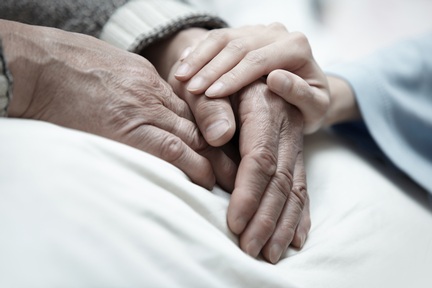Good end-of-life care considers individual's wishes and spiritual beliefs, says NICE
The National Institute for Health and Care Excellence (NICE) has urged health and care workers to do more to ensure they take into account cultural, religious or social preferences of adults in their final days of life.

A new quality standard from the health watchdog sets out standards of care for those aged 18 or over in their last two to three days of life.
This should include asking the person where they want to be cared for and if they have any cultural, religious or social preferences that need to be considered.
Sam Ahmedzai, emeritus professor of palliative medicine and specialist member of the NICE quality standard committee said: “Control of pain and other distressing symptoms is very important for dying people, but good end-of-life care goes far beyond that.
“It includes asking about the dying person’s spiritual, cultural, religious and social preferences. Only by attending to these issues and concerns can we deliver truly individualised care for each person and those important to them.
“How we are cared for can make a big difference to our final days, and lives on in the memories of family and friends. NICE wants to put the dying person and those important to them at the heart of decisions. This means asking people what they want and providing what they need, whenever possible.”
The 2016 End of Life Care Audit reported nearly half of all deaths in England occurred in hospital and spiritual wishes were only documented for one in seven people who were able to communicate their wishes.
It is estimated that about half a million people die each year in England and three out of four of these deaths are anticipated by medical staff.
Adults who display symptoms suggesting they may be in the last days of life should be monitored for further changes, the guidance says. This will help to identify if they are nearing death, stabilising or recovering and allow the person, and those close to them, to prepare accordingly.
Whilst some people can experience difficulty in swallowing during their final days of life, NICE also suggests necessary changes to prescribed medicine (for example providing injections instead of tablets) should be anticipated so that the person is not left without essential medication.
Professor Gillian Leng, deputy chief executive of NICE, said: “We know the vast majority of people in this country receive very good care at the end-of-life, but this isn’t always the case.
“Our guidance will support doctors, nurses and other healthcare professionals so that they can work together to ensure that people die with dignity, whenever possible in the place of their choosing and with their symptoms effectively controlled.”
The National Council for Palliative Care (NCPC) is pleased to support the standard from NICE. Claire Henry, chief executive of the NCPC, added: “We all have a right to good quality end-of-life care, although not everyone currently receives this.
“This standard for the care of dying adults will help people nearing death to receive the care they deserve.”
For more information on the quality standard 'Care of dying adults in the last days of life' go to: https://www.nice.org.uk/guidance/qs144
Latest News
 29-Jul-24
Dementia Bus gives carehome.co.uk staff insight into life with dementia
29-Jul-24
Dementia Bus gives carehome.co.uk staff insight into life with dementia
 01-Mar-24
Find out the top care homes in 2024
01-Mar-24
Find out the top care homes in 2024
 21-Mar-23
UK's top care homes in 2023 revealed
21-Mar-23
UK's top care homes in 2023 revealed
 03-Jan-23
carehome.co.uk launches free care helpline
03-Jan-23
carehome.co.uk launches free care helpline
 13-Dec-22
5 mins with Emily Whitehurst, chief operating officer for Constantia Healthcare
13-Dec-22
5 mins with Emily Whitehurst, chief operating officer for Constantia Healthcare